
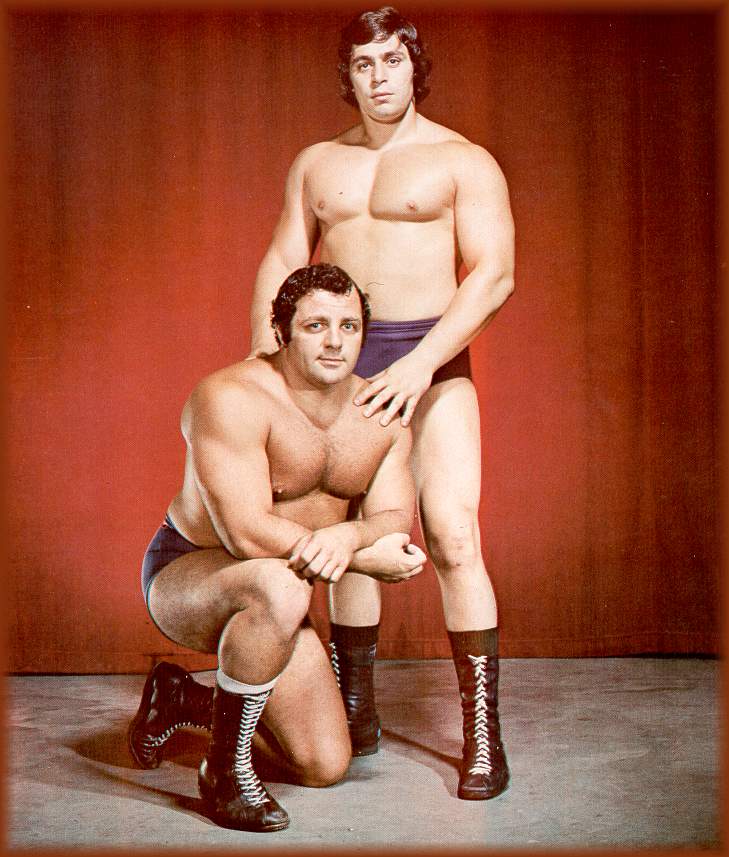
(who wrestled as Jean Ferr�)
The Italian Connection...
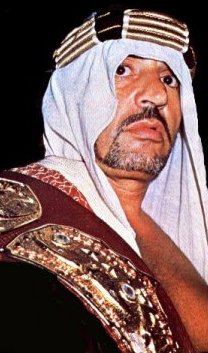
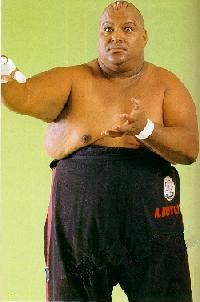
Johnny Rougeau's
most notorius rival
The Sudan Mastodonte
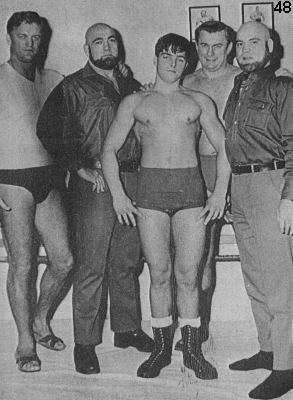
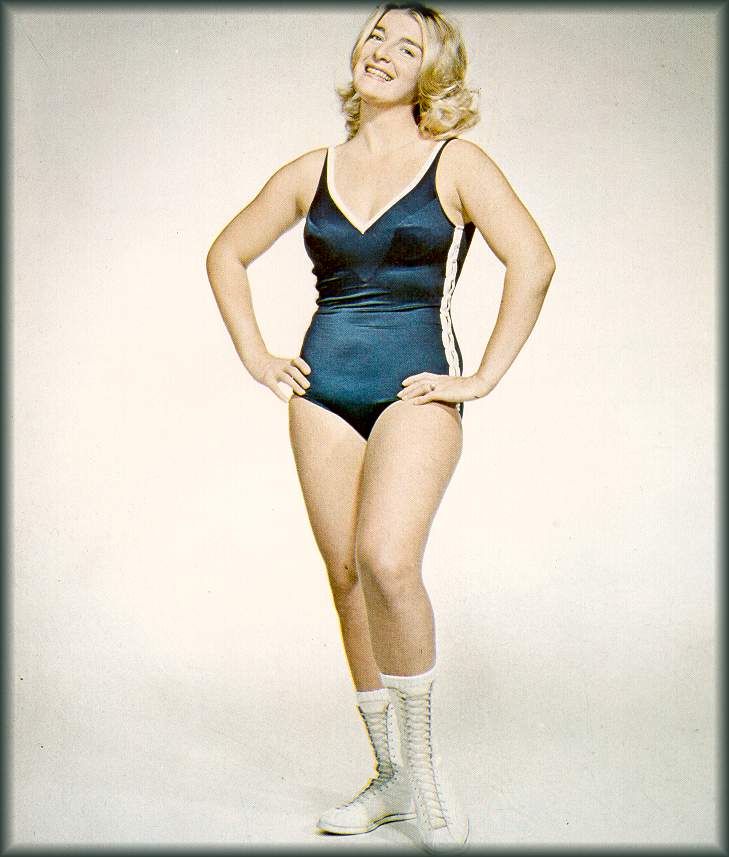
champ
Vivianne Vachon
The Rougeaus and the Leducs...
Republished by DeUxKonE, 2004
| Chapter Five�: The Controversial 70s | |||||||||||||||||||||||||||||||||||||||
 |
|||||||||||||||||||||||||||||||||||||||
 |
|||||||||||||||||||||||||||||||||||||||
| In the 70's, pro wrestling in Quebec was on cruise control, well almost. In 1971, unsatisfied with some booking procedures inside ALL-STAR WRESTLING, several wrestlers including Gino Brito have left the promotion to create GRAND PRIX WRESTLING with Lucien Gregoire as promoter. This created a rivalry paralleled by MLB's American and National Leagues in the World Series. And they had a TV show in both languages... | |||||||||||||||||||||||||||||||||||||||
| Andr� the Giant (who wrestled as Jean Ferr�) |
|||||||||||||||||||||||||||||||||||||||
| Dino Bravo and Gino Brito The Italian Connection... |
|||||||||||||||||||||||||||||||||||||||
| Beside the separation, wrestling was up and coming with the arrival of the Leduc Brothers, Andre the Giant, Dino Bravo, Rick Martel, Sailor White, Michel Dubois, Ivan Koloff and others. | |||||||||||||||||||||||||||||||||||||||
| As well as the first member of the second generation of the Rougeau family�: Raymond, older son of Jacques Sr, who started in 1971. | |||||||||||||||||||||||||||||||||||||||
| However, wrestling was stirring controversy at times. Due to a misconduct of several wrestlers and fans (see next paragraph about Dick Taylor) in a July 30th 1974 at the Montreal Forum, the Montreal Athletic Commission suspends a scheduled gala on August 13th and puts the blame on the promoters. On the night the show was supposed to be presented at the Paul-Sauve Arena, thousands of people with Eddy Creatchman in front protested against the cancelled show. | |||||||||||||||||||||||||||||||||||||||
| In July 3rd 1974, wrestlers Jacques Rougeau, brother Johnny and the Leduc Brothers were accused of brutality against Dick Taylor (due to that assault, he would refuse to participate in a show). The trial was controversial at least�: many members of the wrestling community defended the accused explaining that it was a stupid misfortune and Taylor exagerated his charges. The foursome were acquitted... | |||||||||||||||||||||||||||||||||||||||
 |
|||||||||||||||||||||||||||||||||||||||
| Wrestling became more and more controversial at these times. Several wrestlers were using dangerous articles and illegal weapons (not guns) to cheat and win matches. The Sheik threw fire, Abdullah the Butcher used a fork to cut other wrestlers'foreheads, heel Japanese wrestlers throw salt in faces, etc. It was also the era of special matches�: battle royals, cage matches, strap matches, dog collar matches, russian chain matches, lumberjack matches, no-disqualification matches, and so on... (And these days, Hard Core Wrestling still rules with no limits, mostly in Mexico and Japan...) | |||||||||||||||||||||||||||||||||||||||
 |
|||||||||||||||||||||||||||||||||||||||
| The Sheik... Johnny Rougeau's most notorius rival |
|||||||||||||||||||||||||||||||||||||||
| Abdullah the Butcher The Sudan Mastodonte |
|||||||||||||||||||||||||||||||||||||||
| The Quebec government judged that wrestling has gone too far on these practices, so it proposed a law project restricting the sport itself, to the great dislike of the fans and the wrestlers itself. In a resume, Quebec wanted to ban wrestling indefinitely, to let it come back to a purer form of sport, avoiding the notion of extreme violence it was assoiciated with. | |||||||||||||||||||||||||||||||||||||||
| But, by popular demand, the law proposal backed off. It was unrealistic. However, the Montreal Athletic Commission will impose strict rules such as forbidding a wrestler to be thrown over the third rope, jumping from the top corner, special stipulations matches involving cages, collars, straps and any foreign objects, women's matches and any manager from other associations than the one recognized by the Commission. The Commission also has the right to name the referees to apply those rules. | |||||||||||||||||||||||||||||||||||||||
| In the mid-70's, wrestling was at the peak of its popularity. On July 17th 1972, more than 29000 fans filled Jarry Park (now the Uniprix Tennis Stadium) to see the Rougeaus beat the Arab connection of The Sheik and Abdullah the Butcher (individually). One year later, Grand Prix used the same ball park venue for a show which the main event matched Mad Dog Vachon and Killer Kowalski. Quebec had its first woman wrestler to break through�: Vivianne Vachon, sister of Maurice and Paul Vachon, who drew so close to win a women's championship against the Fabulous Moolah. The same year, Johnny Rougeau hosted a radio show on talk radio station CKVL for one year (Eddy Creatchman was the first guest...).Then Grand Prix was in troubled waters. To help regain popularity, the promotion held several joint shows with All-Star Wrestling. Then it continued to present shows in the Verdun Auditorium until it folded in 1975. CFTM retired its All Star Wrestling TV show as well. With that matter causing low attendances in the Paul Sauv� Arena, Bob Langevin closes the promotion in 1975 Johnny Rougeau retired from wrestling to take care of his hockey team. And more wrestlers were lured by the American dollar and the Japanese yen (it is noted here that in Japan, with the martial arts tradition, all fighters are considered sacred by religious law...). | |||||||||||||||||||||||||||||||||||||||
 |
|||||||||||||||||||||||||||||||||||||||
 |
|||||||||||||||||||||||||||||||||||||||
| Female Wrestling champ Vivianne Vachon |
|||||||||||||||||||||||||||||||||||||||
| Two Great Wrestling Families The Rougeaus and the Leducs... |
|||||||||||||||||||||||||||||||||||||||
| Many attempts to recreate a wrestling promotion in Qu�bec passed by, but with no luck. CELEBRITY WRESTLING was one of them. Then Jack Britton created OLYMPIA PRO SPORTS, without success, as well as SUPER CATCH, created by Paul-�mile DesMarais. George Gannon, the host os Superstars of Wrestling, did promote some shows, including his weekly TV spot at CFCF 12. Gino Brito held somewhat the boat by organizing some shows in the summer with several former stars of Grand Prix and All-Star around parks and festivals in Qu�bec and Ontario... | |||||||||||||||||||||||||||||||||||||||
| This is how INTERNATIONAL WRESTLING will be born... | |||||||||||||||||||||||||||||||||||||||
| Next chapter:The 80s: Wrestling goes International: The American Way ? | |||||||||||||||||||||||||||||||||||||||
| Back to the Welcome Page of Champions... | |||||||||||||||||||||||||||||||||||||||
| Copyright 1999, Productions Leduc 2000 ltd, Montr�al, Qc. Republished by DeUxKonE, 2004 |
|||||||||||||||||||||||||||||||||||||||